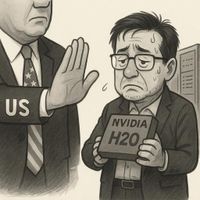SEOUL, April 16 (Yonhap) -- South Korean stocks ended over 1 percent lower Wednesday, snapping a two-day winning streak, as investors unloaded chip shares following Washington's decision to restrict Nvidia's artificial intelligence (AI) chip exports to China.
The benchmark Korea Composite Stock Price Index (KOSPI) shed 29.98 points, or 1.21 percent, to close at 2,447.43. Trade volume was moderate at 601 million shares worth 6.66 trillion won (US$4.67 billion), with losers beating winners 574 to 301.
Institutions and foreign investors sold a combined net 473 billion won worth of stocks, while retail investors bought a net 381.5 billion won. Overnight, Wall Street closed slightly lower as lingering tariff uncertainty swayed investors to move to the sidelines. The S&P 500 fell 0.17 percent, the Dow Jones Industrial Average shed 0.38 percent, and the tech-heavy Nasdaq composite slid 0.05 percent.
Nvidia's stock plunged almost 6 percent in after-hours trading, following the U.S. government's decision to restrict exports of the American chip behemoth's advanced H20 AI chips to China. "News that the U.S. government has decided to restrict exports of Nvidia's H20 chip has contributed to volatility in the South Korean stock market," said Han Ji-young, an analyst at Kiwoom Securities.
In Seoul, semiconductor and automotive shares led the overall decline. Market heavyweight Samsung Electronics plummeted 3.36 percent to 54,700 won, and its chip rival SK hynix plunged 3.65 percent to 174,000 won on the news of the U.S. export curbs. Top automaker Hyundai Motor retreated 2.83 percent to 181,700 won, and affiliate Kia slid 1.28 percent to 84,700 won.
Leading bio firm Samsung Biologics fell 1.06 percent to 1,023,000 won, and top battery manufacturer LG Energy Solution dropped 0.58 percent to 343,000 won. In contrast, financial and defense equipment shares advanced. Kookmin Financial climbed 2.56 percent to 80,000 won, while missile systems manufacturer Hanwha Aerospace rose 2.2 percent to 788,000 won following its announcement to establish a missile joint venture with Poland's WB Group.
The local currency was quoted at 1,426.7 won against the U.S. dollar at 3:30 p.m., down 1.2 won from the previous session.
The U.S. government has decided to limit the export of Nvidia's AI chip H20 exclusively for export to China indefinitely. Initially, there were expectations for the resumption of exports due to the perceived easing of regulations, but the recent imposition of retaliatory tariffs on U.S. products seems to have turned the U.S. to tighten regulations again.
The U.S. Department of Commerce has been notified that a separate export license is required to export H20 chips to China, Nvidia disclosed to the U.S. Securities and Exchange Commission (SEC) on April 16. This permission is interpreted as a de facto export ban, as it is not a temporary measure but an "indefinite application." The H20 was the only high-performance AI chip that was able to export to China, avoiding existing export regulations from the United States.
The top models, H200 and B200, were completely banned from exporting, and only H20 was allowed as a "adjustable chip" that limited performance. However, the U.S. government raised security concerns again after it was recently revealed that the H20 was used as a major training chip for Chinese AI startup DeepSeek. Earlier this year, DeepSeek shocked the U.S. technology industry by introducing an inference-type large-scale language model (LLM) called 'R1.
According to CNBC and others, the U.S. government said it took this action after judging that "H20 is at risk of being used to develop supercomputers or sensitive AI systems in China." Although the performance is low, it is also analyzed that it can have a practical impact on AI model training if thousands of them are connected in parallel.
From Nvidia's point of view, it must be embarrassing. Just a day earlier, CEO Jensen Huang announced that he would invest hundreds of millions of dollars over the next four years to build AI chip production facilities in the United States. This was interpreted as a measure with some deregulation in mind, but the U.S. government reaffirmed its regulatory policy regardless of these investment announcements.
As a result, Nvidia said it would reflect a loss of about $5.5 billion (W7.6 trillion) in the first quarter of fiscal 2026 due to the cost burden of handling related inventory and contract changes. Eventually, Nvidia shares fell as much as 6% on the over-the-counter market.

